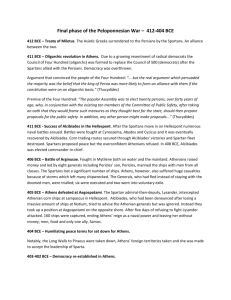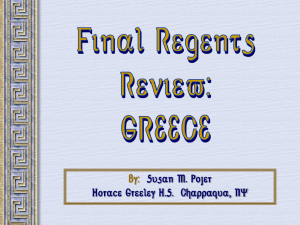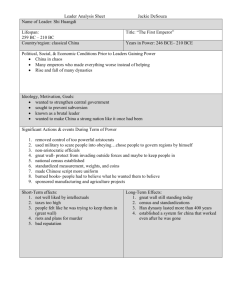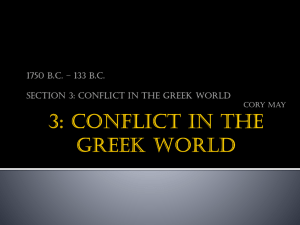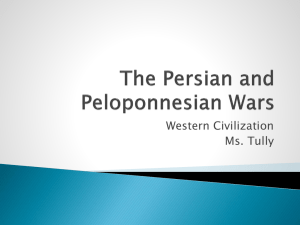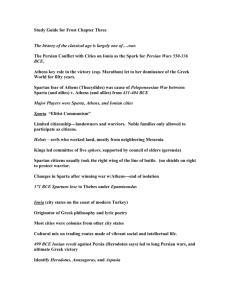The Individual in Thucydides
advertisement
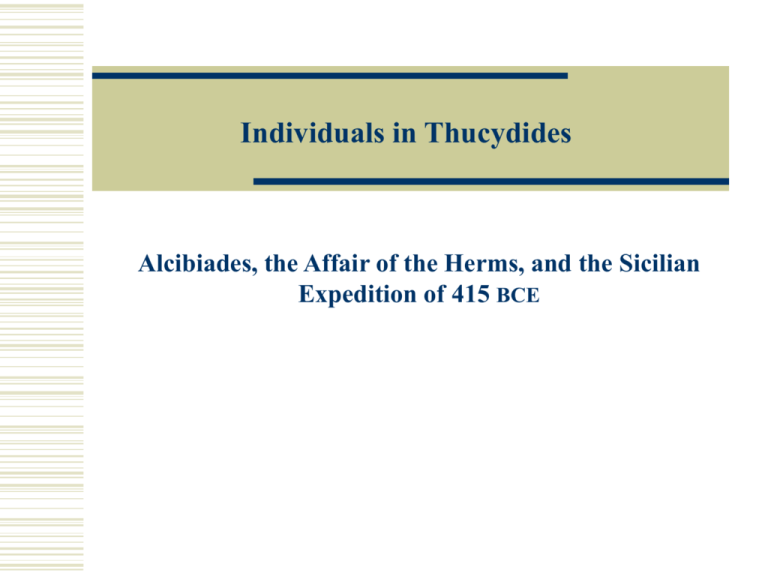
Individuals in Thucydides Alcibiades, the Affair of the Herms, and the Sicilian Expedition of 415 BCE Alcibiades (ca. 450-404 BCE) Raised in household of Pericles; Pupil and friend of Socrates Leader of extreme democrats (ca. 420 BCE) Receives command (with Nicias and Lamachus) of Sicilian expedition (415 BCE) Recalled for allegations of sacrilege (Herms) Defects to Sparta (advises Spartans to send able general to Sicily and to occupy Decelea) Causes Athenian subjects in Ionia to revolt (412 BCE), but falls out of favor with Spartans and flees to Persian satrap Tissaphernes Tries to win Persian support and stage oligarchic coup at Athens Appointed general by Athenian fleet at Samos, directs successful operations in Ionia and Hellespont (Cyzicus in 410 BCE) Returns to Athens (407 BCE) to extraordinary command, but withdraws after his general suffers naval defeat at Notium (406 BCE) Spartans and Thirty Tyrants at Athens have him murdered in Phrygia in 404 BCE Extension of Athenian Naval Power to the West (Sicilian Expedition of 415 BCE) Greece and Sicily Athenian Military Actions Represented as Defensive Precautions Local Sicilian Dispute between Selinuntines and Egestaeans Syracuse supports Selinuntines Egestaeans appeal to Athenians: “They put forward a number of arguments, but the main one was that if Syracuse, after driving out the people of Leontini, were allowed to escape scot-free, and to go on destroying the remaining allies of Athens, until she acquired complete control of Sicily, the danger would then have to be faced that at some time or other the Syracusans…would come with a large force…in the work of utterly destroying the power of Athens.” (Thuc. 6.6; cf. 6.18 [Alcibiades]) Athenians Duped by Egestaeans “At the time when the first ambassadors from Athens had come to look into the question of the money, the Egestaeans had deceived them by the following plan. They took the Athenians to the temple of Aphrodite at Eryx and showed them the treasure laid up there in offerings--bowls, goblets, censers, and much else, which, being silver, looked imposing to the eyes though the value in money was comparatively small. They also entertained the ships’ crews in their private houses, and did this by collecting together all the cups of gold and silver in Egesta itself, borrowing others from the neighboring cities, Phoenician and Greek, and then letting each host produce them at the banquets as though they were his own property. All used pretty much the same articles and everywhere there was a great abundance of them, so that the Athenians from the ships were astonished at it and, when they got back to Athens, told everyone of the vast quantities of valuable objects which they had seen.” Thuc. 6.46; cf. 6.8; 6.22 (Nicias) Athenian Assembly as Plato’s “Huge, Strong Beast” (Republic 493 a-c)?: Rejection of Nicias’ Plea for Moderation and Caution “The Athenians…far from losing their appetite for the voyage because of the difficulties in preparing for it, became more enthusiastic about it than ever….There was a passion for the enterprise which affected everyone alike. The older men thought that they would either conquer the places against which they were sailing or, in any case, with such a large force, could come to no harm; the young had a longing for sights and experiences of distant places, and were confident that they would return safely; the general masses and the average soldier himself saw the prospect of getting pay for the time being and of adding to the empire so as to secure paid employment in the future. The result of this excessive enthusiasm of the majority was that the few who actually were opposed to the expedition were afraid of being thought unpatriotic if they voted against it, and therefore kept quiet.” Thuc. 6.24; see generally Thuc. 6.8-32 Thucydides on Athens’ Real Motives “[T]hey aimed at conquering the whole of Sicily, though they wanted at the same time to make it look as though they were sending help to their own kinsmen and to their newly acquired allies there.” Thuc. 6.6 An Evil Omen: Mutilation of the Herms “While these preparations were going on [preparations for the Sicilian expedition] it was found that in one night nearly all the stone Hermae in the city of Athens had had their extremities cut off. These are a national institution, the well-known square-cut figures, of which there are great numbers both in the porches of private houses and in the temples. No one knew who had done this, but large rewards were offered by the state in order to find out who the criminals were, and there was also a decree passed guaranteeing immunity to anyone, citizen, alien, or slave, who knew of any other sacrilegious act that had taken place and would come forward with information about it. The whole affair, indeed, was taken very seriously, as it was regarded as an omen for the expedition, and at the same time as evidence of a revolutionary conspiracy to overthrow the democracy.” Thuc. 6.27 Carving of a Herm Siege of Syracuse and Sicilian Disaster 415 BCE: Launching of Expedition; mutilation of Herms; recall of Alcibiades 414 BCE: Siege of Syracuse; Spartan commander Gylippus arrives in Sicily 413 BCE: Second Athenian expedition to Sicily; Great Battle in the Syracusan harbor (September 9); Athenian Defeat Individuals in Thucydides: Alcibiades “[H]e was very much in the public eye, and his enthusiasm for horse-breeding and other extravagances went beyond what his fortune could supply. This, in fact, later on had much to do with the downfall of the city of Athens. For most people became frightened at a quality in him which was beyond the normal and showed itself both in the lawlessness of his private life and habits and in the spirit in which he acted on all occasions….Although in a public capacity his conduct of the war was excellent, his way of life made him objectionable to everyone as a person.” Thuc. 6.15 Image and Reality: Compare Pericles’ Funeral Oration (Thuc. 2.37) “We do not get into a state with our next-door neighbor if he enjoys himself in his own way, nor do we give him the kind of black looks which, though they do no real harm, still do hurt people’s feelings. We are free and tolerant in our private lives; but in public affairs we keep to the law.” Alcibiades in Aristophanes’ Frogs “It is not very wise for city-states To rear a lion’s whelp within their gates: But should they do so, they will find it pays, To learn to tolerate its little ways.” Cornford and Thucydides Mythhistoricus Launching of Expedition (Thuc. 6.31-32) Ill Omen of Herms (Thuc. 6.27) Athenian ate (folly) and nemesis (retribution)? (Thuc. 7.18) Tragic Conclusion: “[T]his…did not make the burden seem easier to bear…when they remembered the splendor and pride of their setting out and saw how mean and abject was the conclusion.” (Thuc. 7.75)
